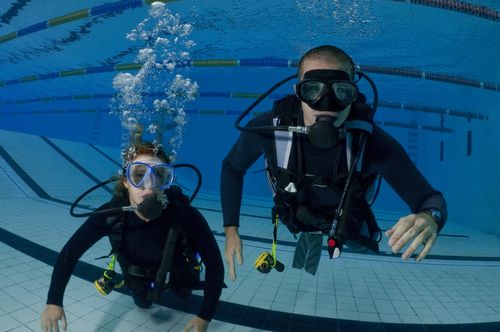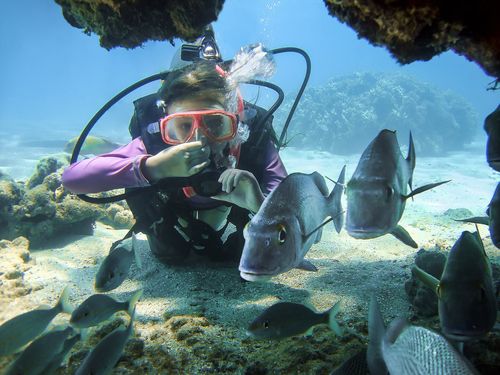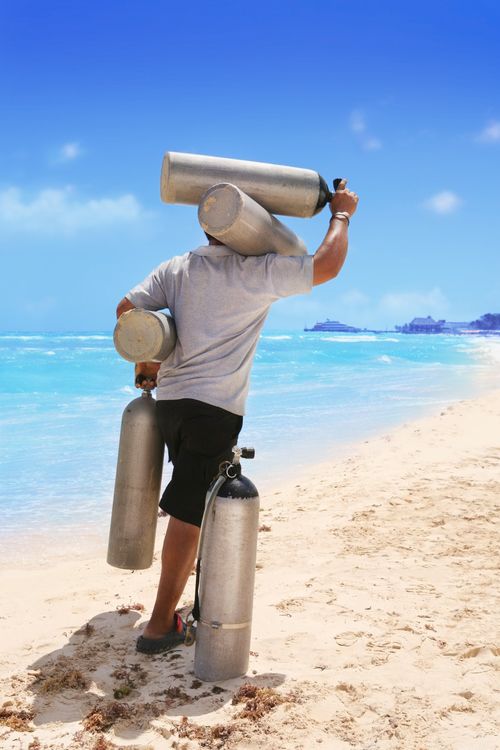Compensation Legislation and the Recreational Diver

By Dr Jack Meintjes (specialist in occupational medicine)
In this article he discusses how employers and employees are affected if an employee is injured or gets Ill as a result of work.
In the previous edition, I highlighted some of the requirements placed on dive operators to ensure that, as far as reasonably practicable, their workplace is (as the Occupational Health and Safety Act [OHSA] states)“safe and without risks to health”. This requirement applies to all employees as well as all persons “other than employees” who could be affected by the business, i.e. the clients who dive with the operator or even just visitors to the business. Although it seems almost illegal for a person to get ill or be injured as a result of someone else’s business, we know it is impossible to guarantee 100% that this will not happen. Someone will inevitably twist an ankle or develop decompression sickness, not even mentioning middle-ear barotrauma. Therefore, there is a need for yet another act to specify the procedure for persons who are injured at work or get ill as a result of working activities – the
Compensation for Occupational Injuries and Diseases Act (COIDA).
In terms of the COIDA, any employee who suffers a work-related diseaseor injury is eligible to receive compensation. A distinction is made between an occupational injury and an occupational disease.
In this article he discusses how employers and employees are affected if an employee is injured or gets Ill as a result of work.
In the previous edition, I highlighted some of the requirements placed on dive operators to ensure that, as far as reasonably practicable, their workplace is (as the Occupational Health and Safety Act [OHSA] states)“safe and without risks to health”. This requirement applies to all employees as well as all persons “other than employees” who could be affected by the business, i.e. the clients who dive with the operator or even just visitors to the business. Although it seems almost illegal for a person to get ill or be injured as a result of someone else’s business, we know it is impossible to guarantee 100% that this will not happen. Someone will inevitably twist an ankle or develop decompression sickness, not even mentioning middle-ear barotrauma. Therefore, there is a need for yet another act to specify the procedure for persons who are injured at work or get ill as a result of working activities – the
Compensation for Occupational Injuries and Diseases Act (COIDA).
In terms of the COIDA, any employee who suffers a work-related diseaseor injury is eligible to receive compensation. A distinction is made between an occupational injury and an occupational disease.

Occupational Injuries
An occupational injury is only compensable if all of the following conditions are met:
Common injuries associated with a diving operation would include all barotraumas (ear, sinuses, lungs, etc.). A back injury caused by lifting heavy gear or a muscle injury sustained during a boat launch would also be considered an occupational injury. The bottom line is that any injury sustained while performing work (which is any act for which a person is remunerated) is potentially compensable.
Occupational Diseases
Occupational diseases are listed in Schedule 3 of the COIDA. All employers and employees involved in diving operations should be aware of the following, which is compensable:
An occupational injury is only compensable if all of the following conditions are met:
- The person must suffer a personal injury or death as a result of an accident.
- The accident must happen while the person is busy with his or her work.
- The accident must be caused by the person’s work.
- The person must be an employee.
Common injuries associated with a diving operation would include all barotraumas (ear, sinuses, lungs, etc.). A back injury caused by lifting heavy gear or a muscle injury sustained during a boat launch would also be considered an occupational injury. The bottom line is that any injury sustained while performing work (which is any act for which a person is remunerated) is potentially compensable.
Occupational Diseases
Occupational diseases are listed in Schedule 3 of the COIDA. All employers and employees involved in diving operations should be aware of the following, which is compensable:
- Hearing impairment caused by noise (for all the compressor operators)
- All diseases caused by being exposed to pressure (decompression sickness, gas embolism, dysbaric osteonecrosis, etc.)
- Diseases caused by ultraviolet radiation (sunburn, skin cancer, etc.)
- Diseases caused by chronic or repetitive exposure to productsof combustion
- Occupational skin diseases (e.g. allergies to wetsuits or marine life)
- Diseases caused by asphyxiants (e.g. carbon monoxide poisoning)

Where to from Here?
All employers are legally obliged to ensure that they are registered with the compensation commissioner. Furthermore, they should ensure that they comply with the provisions of the OHSA (see Occupational Health andSafety Legislation and the Recreational Diver in the Spring 2012 edition).
All employees should inform the treating doctor that the injury or illness he or she suffers is (likely) the result of work. Specific forms and documents need to be completed by the doctor, the injured diver and the employer. These can all be downloaded from the website of the Department of Labour. Divers and dive operators are also welcome to contact the DAN-SA hotline for advice and assistance.
Injured employees are required to inform their employer of the incident as soon as possible. Employers must report the incident to the compensation commissioner within seven days (an employer who fails to do so is guilty of an offence in terms of the COIDA). It should further be noted that the Act specifically states that an employer is required to report an accident whenever an employee alleges that it was caused by his or her work – irrespective of whether the employer agrees that this is the case. No claim would be paid to any employee if such a claim has not been lodged with the compensation commissioner (i.e. the employee has informed the employer, who in turn informed the compensation commissioner) within 12 months from the date of the accident.
What does the Compensation Entail?
Although it sounds great, there is no need for employees to develop “compensitis” which seems to be an incurable disease. Compensation actually protects the employer much more than it does the employee. In terms of the legislation, an employee is obliged to make use of the compensation system when suffering an occupational injury or illness and, in doing so, the employee also loses the right to any other legal action against the employer in terms of such an injury or disease. That is why we do not see legal cases against employers in South Africa. There is thus a clear benefit for employers to ensure that all their paperwork is in place. Compensation would have the following advantages for injured or ill employees:
What about Persons who are not Employees?
Persons who are not employees cannot receive any benefits in terms of the COIDA. The business owner also does not have any protection from the COIDA, unless also doing work as an employee. All non-employees are thus able to instigate a civil (legal) claim against a business that could have been involved in an injury or illness. Such a claim would increase dramatically if negligence is proven, e.g. insufficient oxygen available during decompression sickness.
All dive operators and business owners should thus ensure that they complywith the provisions of the OHSA (not to be negligent) and also ensure that they put procedures and documentation in place to minimise their risk. This would include using an indemnity form that needs to be signed by all clients (after all, divers choose to take at least some risk when they go diving). Furthermore, all activities (not only the dives) should be well planned and executed including information provided to clients to ensure they know which safety measures are put in place by the operator (especially if they need to comply with specific provisions, e.g. not wearing slippery shoes in the diving shop). Protocols should be in place to deal with any injury or illness that may occur as a result of the activities (including emergency contact numbers available after hours). The HIRA programme proposes that all dive operators should involve a local medical practitioner who could provide support in case of an injury or illness (DAN can suggest specific specialised training for the doctor).
Even with all the planning and procedures, the risk cannot be totally avoided. Serious consideration should therefore be given to financing the residual risk by means of appropriate insurance.
All employers are legally obliged to ensure that they are registered with the compensation commissioner. Furthermore, they should ensure that they comply with the provisions of the OHSA (see Occupational Health andSafety Legislation and the Recreational Diver in the Spring 2012 edition).
All employees should inform the treating doctor that the injury or illness he or she suffers is (likely) the result of work. Specific forms and documents need to be completed by the doctor, the injured diver and the employer. These can all be downloaded from the website of the Department of Labour. Divers and dive operators are also welcome to contact the DAN-SA hotline for advice and assistance.
Injured employees are required to inform their employer of the incident as soon as possible. Employers must report the incident to the compensation commissioner within seven days (an employer who fails to do so is guilty of an offence in terms of the COIDA). It should further be noted that the Act specifically states that an employer is required to report an accident whenever an employee alleges that it was caused by his or her work – irrespective of whether the employer agrees that this is the case. No claim would be paid to any employee if such a claim has not been lodged with the compensation commissioner (i.e. the employee has informed the employer, who in turn informed the compensation commissioner) within 12 months from the date of the accident.
What does the Compensation Entail?
Although it sounds great, there is no need for employees to develop “compensitis” which seems to be an incurable disease. Compensation actually protects the employer much more than it does the employee. In terms of the legislation, an employee is obliged to make use of the compensation system when suffering an occupational injury or illness and, in doing so, the employee also loses the right to any other legal action against the employer in terms of such an injury or disease. That is why we do not see legal cases against employers in South Africa. There is thus a clear benefit for employers to ensure that all their paperwork is in place. Compensation would have the following advantages for injured or ill employees:
- The employee does not need to take any employer to court in the case of a work-related accident or illness. Compensation is guaranteed for all such injuries and diseases.
- The compensation covers sick leave (temporary incapacity) at 75% of thenormal pay rate for a period not exceeding 24 months (although youwould never have that much sick leave available).
- Medical aid, to cover all reasonable medical expenses, is made availablefor a period of up to two years. All medical expenses, including follow-upvisits, are covered during this period.
- In the case of the employee suffering a permanent disability, theemployee would receive financial compensation for this loss.Note, however, that the compensation does not cover loss of incomeor loss of ability to work, e.g. being declared unfit to dive as a resultof serious decompression sickness. The employee is literally onlycompensated for the medical impairment that could objectivelybe assessed. A complete recovery to normal function means that nocompensation would be paid. Therefore, most employees would notreceive compensation for permanent disability as a result of a workrelatedinjury.
- If the occupational injury or illness causes the death of the employee,all the burial expenses are covered by the compensation commissionerand compensation is also paid to the direct dependants of the employee.
What about Persons who are not Employees?
Persons who are not employees cannot receive any benefits in terms of the COIDA. The business owner also does not have any protection from the COIDA, unless also doing work as an employee. All non-employees are thus able to instigate a civil (legal) claim against a business that could have been involved in an injury or illness. Such a claim would increase dramatically if negligence is proven, e.g. insufficient oxygen available during decompression sickness.
All dive operators and business owners should thus ensure that they complywith the provisions of the OHSA (not to be negligent) and also ensure that they put procedures and documentation in place to minimise their risk. This would include using an indemnity form that needs to be signed by all clients (after all, divers choose to take at least some risk when they go diving). Furthermore, all activities (not only the dives) should be well planned and executed including information provided to clients to ensure they know which safety measures are put in place by the operator (especially if they need to comply with specific provisions, e.g. not wearing slippery shoes in the diving shop). Protocols should be in place to deal with any injury or illness that may occur as a result of the activities (including emergency contact numbers available after hours). The HIRA programme proposes that all dive operators should involve a local medical practitioner who could provide support in case of an injury or illness (DAN can suggest specific specialised training for the doctor).
Even with all the planning and procedures, the risk cannot be totally avoided. Serious consideration should therefore be given to financing the residual risk by means of appropriate insurance.
Posted in Alert Diver Fall Editions
Posted in Dive Instruction, Instructors, Scubalearners, Diveleaders, Safety, Legislation, Labour laws
Posted in Dive Instruction, Instructors, Scubalearners, Diveleaders, Safety, Legislation, Labour laws
Categories
2025
2024
February
March
April
May
October
My name is Rosanne… DAN was there for me?My name is Pam… DAN was there for me?My name is Nadia… DAN was there for me?My name is Morgan… DAN was there for me?My name is Mark… DAN was there for me?My name is Julika… DAN was there for me?My name is James Lewis… DAN was there for me?My name is Jack… DAN was there for me?My name is Mrs. Du Toit… DAN was there for me?My name is Sean… DAN was there for me?My name is Clayton… DAN was there for me?My name is Claire… DAN was there for me?My name is Lauren… DAN was there for me?My name is Amos… DAN was there for me?My name is Kelly… DAN was there for me?Get to Know DAN Instructor: Mauro JijeGet to know DAN Instructor: Sinda da GraçaGet to know DAN Instructor: JP BarnardGet to know DAN instructor: Gregory DriesselGet to know DAN instructor Trainer: Christo van JaarsveldGet to Know DAN Instructor: Beto Vambiane
November
Get to know DAN Instructor: Dylan BowlesGet to know DAN instructor: Ryan CapazorioGet to know DAN Instructor: Tyrone LubbeGet to know DAN Instructor: Caitlyn MonahanScience Saves SharksSafety AngelsDiving Anilao with Adam SokolskiUnderstanding Dive Equipment RegulationsDiving With A PFOUnderwater NavigationFinding My PassionDiving Deep with DSLRDebunking Freediving MythsImmersion Pulmonary OedemaSwimmer's EarMEMBER PROFILE: RAY DALIOAdventure Auntie: Yvette OosthuizenClean Our OceansWhat to Look for in a Dive Boat
2023
January
March
Terrific Freedive ModeKaboom!....The Big Oxygen Safety IssueScuba Nudi ClothingThe Benefits of Being BaldDive into Freedive InstructionCape Marine Research and Diver DevelopmentThe Inhaca Ocean Alliance.“LIGHTS, Film, Action!”Demo DiversSpecial Forces DiverWhat Dive Computers Don\'t Know | PART 2Toughing It Out Is Dangerous
April
